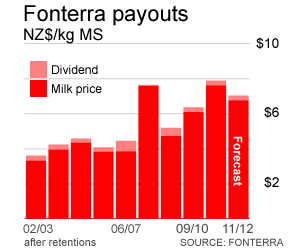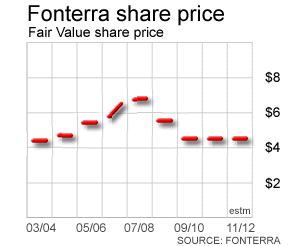 A higher than expected exchange rate and the announcement of US export subsidies for farmers this week have led Fonterra to announce a payout forecast for the 2009/10 dairy season that was well below expectations and could take NZ$1 billion out of the New Zealand economy.
A higher than expected exchange rate and the announcement of US export subsidies for farmers this week have led Fonterra to announce a payout forecast for the 2009/10 dairy season that was well below expectations and could take NZ$1 billion out of the New Zealand economy.
Fonterra announced today its first payout forecast for the 2009/10 dairy season was NZ$4.55 per kg of milk solids.
This was made up of a milk price of NZ$4.10 and a value added component of 45 cents.
Economists were expecting a payout forecast of over NZ$5.00/kg. (Update 2 includes comments from Fonterra's Chairman and CEO in a news teleconference and comments from Federated Farmers)
This forecast was assuming an exchange rate of 59 US cents, Fonterra said.
Fonterra also left its forecast for the current dairy season unchanged at NZ$5.20, including a 45 cent value return component made in the final payout at the end of October.
"We were looking at a forecast over NZ$5 when the Kiwi was at 50 (US) cents but the rebound means we're now working with a dollar that's 10 cents higher," Fonterra Chairman Henry van der Heyden said about the 2009/10 forecast.
"And, just this week, at a time when we've been seeing some tentative signs of recovery in the global dairy market, the US Government has announced export subsidies for their farmers, which is bad news for our farmers," van der Hayden said.
 Fonterra also said it had set its fair value share price for 2009/10 at NZ$4.52.
Fonterra also said it had set its fair value share price for 2009/10 at NZ$4.52.
This was down NZ$1.05 from the NZ$5.57 price for 2008/2009, and 5 NZcents below the previous forecast in December.
Van der Heyden said the fall in the share price was understandable given the external factors which have seen a dramatic drop in share values around the world. However, farmers holding excess shares have the option of selling them at this season's price, he said.
"This season farmers holding excess shares (above their current season's production) will be able to sell them at the current season's share price of NZ$5.57. Farmers will then have the opportunity to buy any additional Co-operative shares they need to cover their expected production in the new season at NZ$4.52 at the beginning of the 2009/10 season rather than the end," van der Heden said.
"We had expected dairy prices to be bouncing along the bottom at the moment, but the exchange rate has been a big negative. It has a huge influence on the Milk Price forecast when you go into the new season with a large chunk of your sales unhedged, which is always the case at this time of the year," van der Heyden said.
"Our hedging policy is designed to take out the volatility and provide as much certainty for our farmers as possible.
But as a rule of thumb a 1 cent movement in the exchange rate realised over a year has an impact of about +/- 10 cents per kgMS in the Milk Price, with everything else being equal," he said.
"We'd certainly like to see the exchange rate come down and stay lower. That would benefit our farmers and New Zealand's export returns. Our farmers are already under severe financial pressure and it's also bad news for the country as a whole. A payout at this level would take hundreds of millions of dollars out of the economy."
Earlier this week, most economists said their forecasts for the 2009/10 season were little different from the current one, and that the export subsidy announcement from the US had not affected forecasts.
Westpac said it forecast a final payout of NZ$4.90; ANZ National said slightly above NZ$5.00; BNZ between NZ$5.10 and NZ$5.20; and NZX-Agri-Fax said NZ$5.25.
Later in a news teleconference, Fonterra Chairman Henry Van der Heyden said the NZ$4.55/kg payout was below earlier indications given to farmers several months ago of a NZ$5/kg payout.
The difference between then and now was a move in the currency back over 60 USc from 50 USc. This reduction in the payout would take about NZ$1 billion out of the economy, he said. "This will put our farmers under significant cash-flow pressure," van der Heyden said.
"We've spent a lot of time anguishing over this but at the end of the day we can only return what the market has produced," he said.
Fonterra had decided to bring forward a payment of 20 cents/kg or around NZ$250 million to August from October for the current 2008/09 season to help ease some the cashflow pain.
The advance payment for 2009/10 from June would be NZ$2.90/kg, van der Heyden said.
Fonterra forecast production for 2008/09 rose 7.5% to 1,280 mln kgs.
Fonterra CEO Andrew Ferrier said commodity prices had bottomed out a couple of months ago and now "we're bouncing around the bottom."
"We're still wanting to see a demand recovery and that's keeping the market very uncertain," Ferrier said, adding US moves to reintroduce dairy export subsidies had further destabilised the market.
Ferrier said faster than expected sales of milk powder inventory and the benefit of extra share sales because of higher production meant Fonterra's balance sheet would look slightly better by the end of the financial year on July 31 than expected earlier. Fonterra's debt to debt plus equity ratio would improve to 53.5% by the end of July, "which was a little bit better than we expected a few months ago."
This ratio would below the 50% target within the next 12 months, Ferrier said, down from 61.5% at the end of January. Fonterra did not know how many farmers would take up the option to buy any extra shares needed to back their 2009/10 output early, which would improve the capital position. Van der Heyden said 60% of farmers had excess shares they needed to sell back to Fonterra for the 2008/09 season, while 40% needed to buy shares to back their extra production.
Meanwhile, Federated Farmers said forecast was "the day the recession hit home."
"These numbers are bleak," said Lachlan McKenzie, Federated Farmers dairy chairman. "So if you live in the city and think you're immune from this, think again. It's a hell of a lot of money that isn't coming through the front door of the economy," McKenzie said.
Federated Farmers said it was concerned about Fonterra's "ongoing fixation with its capital structure."
"Senior management and the board have to focus on servicing customers and shareholders to maximise revenue. Farmers cannot afford to have the eye of management and the board off the ball and on a shiny new capital structure that is a low priority for most shareholders."

We welcome your comments below. If you are not already registered, please register to comment
Remember we welcome robust, respectful and insightful debate. We don't welcome abusive or defamatory comments and will de-register those repeatedly making such comments. Our current comment policy is here.